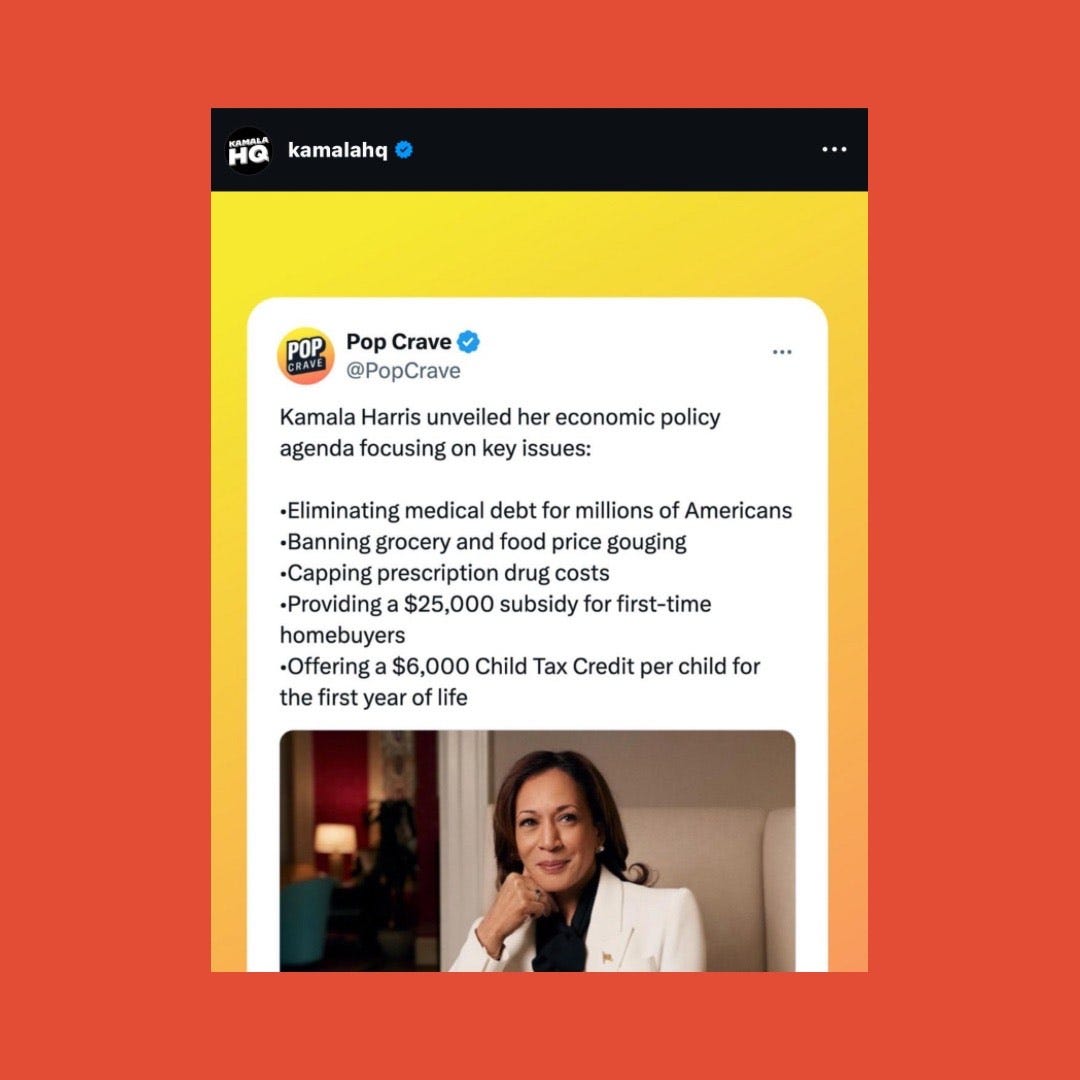On Friday, Kamala Harris unveiled a new set of campaign policy proposals aimed at lower costs for American families at the grocery store, drugstore, and at home. Some good, some not so good, but overall pretty meh. Here are some of my quick reactions to some of the Harris-Walz campaign proposals focusing on their key issues.
🛒 Ban on Price Gouging for Groceries and Food
This sounds nice in theory, but that’s it, it’s just a theory. Despite being a major section of their press release for the campaign’s policy proposals, they don’t offer any details on how a ban like this would be enforced. With that, there is no clear signal of what behaviors would be outlawed for corporations if enacted. This one is difficult to gauge because there isn’t much to gauge at the moment. Plus, it is already illegal for producers to coordinate to fix prices (this is not considered price gouging btw), something which Harris also stated to tackle even harder.
💊 $2k Cap on Out-of-Pocket Spending for Prescription Drugs
Another good idea by the Harris campaign, but it will all come down to the execution. The campaign also plans to cap the cost of insulin at $35. This is a highly popular policy that would help all American families. The Inflation Reduction Act, which Harris cast the tie-breaking vote for, has made progress on this front already, specifically for seniors by allowing Medicare to start negotiating price of certain drugs in 2025.
🏥 Eliminate Medical Debt for Millions of Americans
Harris and Walz vow to work with states to cancel medical debt and assist in eliminating the structures that allow such debt to be accumulated. The campaign plans to build upon the Biden-Harris administration’s work of canceling $7 billion of medical debt for up to 3 million Americans and removing medical debt from nearly all Americans’ credit reports. Again, other than some nice sentiment there are no real concrete details of how this will be accomplished. But this is where the Harris-Walz campaign is drawing the distinction between them and Trump and Project 2025.
🏗️ Historic Tax Credit for Building Starter Homes
While well-intended, this proposal is bad because it’s incredibly off-based. The idea that the primary barrier to building more housing is its profitable is what’s driving this policy. And the idea that we need public subsidies to encourage home builders is not necessary. And the target conditioning of receiving the credit based on them selling to a first-time homebuyer is somewhat illogical, as home builders oftentimes don’t know in advance who they are selling to when construction starts, and there are better ways to increase opportunities for first-time homebuyers to buy homes.
🏠 $25k Subsidy for First-Time Homeowners
This at first glance sounds like an exciting proposal, but its essential a grant for those who already have enough money to buy a home. If you cannot afford to buy a home or prefer to rent, this subsidy does nothing for you. It’s a demand subsidy without corresponding price controls, meaning portions of that money is bound to be captured by higher prices, negating any goals of affordability that the Harris-Walz campaign is seeking with this proposal. In my opinion, the only way to achieve more affordability housing for homebuyers, and renters, is to make becoming a landlord unprofitable.
🚼 Child Tax Credit Expansion to $6k for Newborns
Sometimes referred to as a “baby bonus,” this is one of the actually good ideas from the campaign in this proposal. Ideally, this would be given as a direct cash grant paid out by Social Security; and, like in other countries, this “baby bonus” would be provided a couple months in advance of the birth so that families can use the money to prepare for the baby’s arrival. Although, because this is a tax credit it runs into its own problems: Parents won’t have access to this money until the year after and many of the poorest parents who don’t file taxes won’t receive this credit at all.
🚸 Bring Back ARPA’s Expanded Child Tax Credit
The current Child Tax Credit is $2,000 per child. Under the American Rescue Plan Act (ARPA), the expanded Child Tax Credit would provide up to $3,600 per child. But similar to what I said about the the newborn tax credit, while the basic idea of it is good, it’s concept and execution in 2021 excluded poor families from receiving the benefit. The campaign’s focus on the middle class, while necessary, shows their neglect of the poorest of our country.
Villain’s View
A lot of these are extensions of Biden policy—but good extensions nonetheless. If you would’ve asked me just even mere months ago, I don’t think I ever would’ve thought we’d see progressive policy like this from a Democratic presidential nominee, let alone Kamala Harris. And yes, while a lot of these policies are good intentioned, they do miss the mark. There are some great ideas just without a clear way through, and ideas that don’t go far enough. Overall while it seems like a bunch of meh policy points, they make me hopeful for the future of a more progressive Democratic Party.





